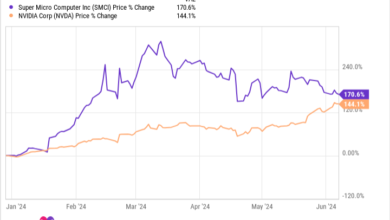Can Artificial Intelligence (AI) Really Help Make You a Millionaire Before Retirement?

AI can be a great tool for retirement planning, but it’s not an advisor.
Reality often doesn’t live up to the hype with new technologies. For example, 3D printing hasn’t been the game-changer many expected. However, artificial intelligence (AI) just might be an exception.
AI is already transforming multiple areas, including the world of investment planning. New AI models can digest every book and article about investing and money management. Imagine harnessing the power of this technology to plan your financial future. Can AI really help make you a millionaire before retirement?
Image source: Getty Images.
Nine in 10 investment managers are using AI or plan to use it
OpenAI’s GPT-4 AI model passed the Uniform Bar Exam — beating the average score of humans taking the exam. GPT-4, Anthropic’s Claude3-Opus, Alphabet‘s Google Gemini Advanced, and other AI models have performed well on Certified Public Accountant (CPA) exam practice tests.
So far, no AI system has successfully passed the Certified Financial Planner (CFP) or the Chartered Financial Analyst (CFA) exams. However, don’t be surprised if these hurdles are jumped in the not-too-distant future. AI is improving at a breakneck speed.
Investment firms aren’t waiting to put AI to work, though. A recent Mercer survey found that 54% of investment managers are currently using AI with another 37% planning to do so.
Last year, Morgan Stanley became the first Wall Street firm to make an AI assistant available to all of its financial advisors. The technology helps advisors answer questions about markets and make recommendations to clients.
Should you use AI to help plan your retirement?
Since professional investment managers are using AI, should you also use AI to help plan your retirement? I think the answer is “yes” — but with caveats.
The operative word in the question above is “help.” Current AI models could be a good resource to help get you started with retirement planning. They can assist in analyzing your income, expenses, debt, and savings. They can help you determine your risk tolerance. AI systems can also provide information about different investment strategies.
However, it’s important to understand that AI is a tool, not an advisor. And while models have improved, they can still give inaccurate responses.
No AI system is able to fully appreciate your personal financial background and goals. Using AI could be a good starting point with retirement planning, but it’s wise to also talk with a professional financial advisor who is a fiduciary (which means they’re required by law to manage your money for your benefit and not theirs).
A good start
I was curious about how AI models would respond when asked what steps I should take to become a millionaire retiree. I posed this question to GPT-4, Google Gemini, Meta AI, and Claude3.
The answers these AI models gave were generally similar — and sound. For example, all four models recommended starting investing early. All of them also emphasized minimizing debt. Three of the four models suggested using tax-advantaged retirement accounts such as IRA and 401(k) plans.
Could you become a millionaire retiree if you followed all of the recommendations from GPT-4, Google Gemini, Meta AI, and Claude3? Maybe, maybe not. The amount you save and the number of years you have to allow your money to grow will make a huge difference in achieving this goal. However, the AI models’ responses provide a good start.
Suzanne Frey, an executive at Alphabet, is a member of The Motley Fool’s board of directors. Randi Zuckerberg, a former director of market development and spokeswoman for Facebook and sister to Meta Platforms CEO Mark Zuckerberg, is a member of The Motley Fool’s board of directors. Keith Speights has positions in Alphabet and Meta Platforms. The Motley Fool has positions in and recommends Alphabet and Meta Platforms. The Motley Fool has a disclosure policy.



